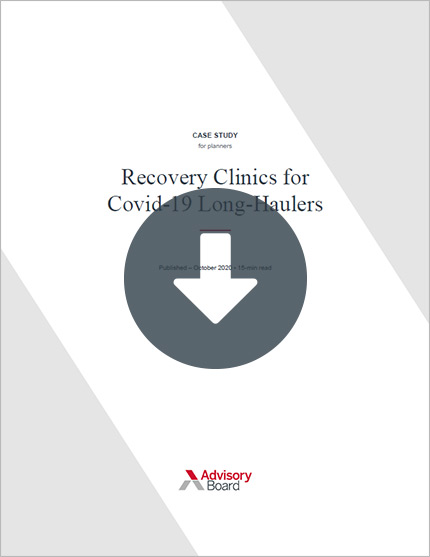Auto logout in seconds.
Continue LogoutThree new studies analyzing long Covid attempted to determine how prevalent the condition is, how long the condition lasts, and what causes it. Here's what they found.
Case study: Recovery clinics for Covid-19 long-haulers
How prevalent is long Covid?
In a CDC study, researchers looked at the medical records of 353,164 people who were diagnosed with Covid-19 during the first 18 months of the pandemic and compared them with the records of 1.64 million people who had a medical visit during that time period but were not diagnosed with Covid.
The researchers found that, between 30 and 365 days after their initial coronavirus diagnosis, 35% of patients ages 18 to 64 and 45% of patients ages 65 and older experienced at least one new health problem. In comparison, 15% of uninfected patients ages 18 to 64 and 19% of uninfected patients ages 65 and older had new health symptoms. The researchers determined that almost 21% of those ages 18 to 64 and nearly 27% of those ages 65 and older had developed health issues related to long Covid.
The most common symptom of long Covid reported by all patients were respiratory problems and musculoskeletal pain; however, other symptoms included pulmonary embolism, kidney failure, neurological conditions, and some mental health conditions.
The authors of the study recommended "routine assessment for post-Covid conditions among persons who survive Covid-19."
Ziyad Al-Aly, chief of research and development at the V.A. St. Louis Health Care System and a clinical epidemiologist at Washington University in St. Louis, said the results of the study "can potentially translate into millions of people with new diabetes, heart disease, kidney disease, neurologic problems. These are lifelong conditions—certainly manageable, but not curable conditions."
How long does long Covid last?
In another study, published in the Annals of Clinical and Translational Neurology, researchers looked at 52 patients who were part of a group of 100 long Covid patients surveyed last year. The patients in the study participated between 11 and 18 months following their Covid-19 diagnosis.
The study found that long Covid-19 symptoms could last 14.8 months after initial infection. Specifically, the study found that there was no "significant" change in how frequent neurologic symptoms persisted between the patients' first and second evaluations. These symptoms included brain fog, numbness and tingling, headache, and dizziness.
Participants in the study said they found "improvements in their recovery, cognitive function, and fatigue, but quality of life measures remained lower."
"In addition, there were no significant changes in the frequency of non-neurologic symptoms including fatigue, depression/anxiety, shortness of breath, chest pain, and insomnia," the study said.
What causes long Covid?
In a third study, published in the Annals of Internal Medicine, researchers at NIH compared 189 Covid-19 patients with 120 patients without Covid-19 to determine what might make someone more likely to develop long Covid.
The researchers also conducted 130 tests on the patients to determine if any vital organs were damaged, whether the coronavirus was still present in their bodies, or if their immune systems weren't working properly.
"An extensive medical evaluation failed to reveal a cause for these persistent symptoms in most cases," said Michael Sneller, an infectious disease specialist who led the study.
"We were not able to find evidence of the virus persisting or hiding out in the body," Sneller said. "We also did not find evidence that the immune system was overactive or malfunctioning in a way that would produce injury to major organs in the body."
The researchers did find that women and those with anxiety were more likely to develop long Covid. However, the researchers cautioned that doesn't mean long Covid symptoms are psychological.
"I clearly don't want to send the message that this is all not real. And in peoples' heads. And just go home and stop worrying about it," Sneller said. "That's not the message."
Sneller added that he's continuing to study long Covid patients, including the patients in his study. "We [are] continuing the analysis for any evidence of autoimmunity or anything else," he said. "This paper is not the end of it—it's just the beginning." (Belluck, New York Times, 5/24; Vakil, The Hill, 5/24; Stein, "Shots," NPR, 5/24)
Download the case study

Several health systems have set up dedicated recovery clinics to help treat and coordinate care for long-haulers. This resource provides an overview of Covid-19 recovery clinic models pioneered by two early adopters—The University of Iowa Hospitals and Clinics and the University of Pennsylvania Medicine—and considerations for assessing whether it is a model you should pursue.
Don't miss out on the latest Advisory Board insights
Create your free account to access 1 resource, including the latest research and webinars.
Want access without creating an account?
You have 1 free members-only resource remaining this month.
1 free members-only resources remaining
1 free members-only resources remaining
You've reached your limit of free insights
Become a member to access all of Advisory Board's resources, events, and experts
Never miss out on the latest innovative health care content tailored to you.
Benefits include:
You've reached your limit of free insights
Become a member to access all of Advisory Board's resources, events, and experts
Never miss out on the latest innovative health care content tailored to you.
Benefits include:
This content is available through your Curated Research partnership with Advisory Board. Click on ‘view this resource’ to read the full piece
Email ask@advisory.com to learn more
Click on ‘Become a Member’ to learn about the benefits of a Full-Access partnership with Advisory Board
Never miss out on the latest innovative health care content tailored to you.
Benefits Include:
This is for members only. Learn more.
Click on ‘Become a Member’ to learn about the benefits of a Full-Access partnership with Advisory Board
Never miss out on the latest innovative health care content tailored to you.
